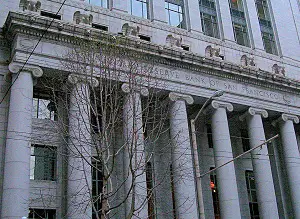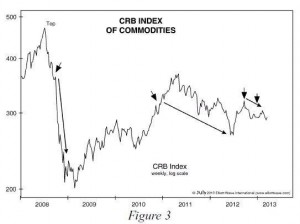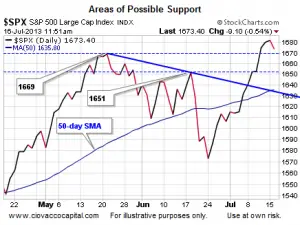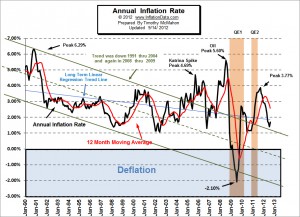The Federal Reserve The Federal Reserve serves as the Central Bank of the United States, and whether you realize it or not, it plays an active role in the lives of every American. It makes decisions about monetary policy and interest rates that have a direct impact on the market and an indirect impact on everyone. The FED uses inflation targets to determine how much they can devalue (inflate) the currency. Many people believe that they created a massive money printing scheme cryptically called "Quantitative Easing"since QE1 converted almost worthless mortgage backed securities into currency. The Fed regularly issues statements about how inflation isn't really as bad as everyone says it … [Read more...]
Commodity Prices Falling Despite QE
Traditional wisdom tells us that when the money supply expands the price of commodities rises. Today Robert Prechter takes a look at what has actually happened to commodity prices since 2008 during a period when theoretically the FED has been pumping up the money supply. ~Tim McMahon, editor Commodities Falling Despite QE: What Does That Mean? Robert Prechter: "Charts tell the truth. Let's look at some charts." By Elliott Wave International During QE3, the latest round of the Fed's quantitative easing, the stock market rose. We all know that. But did you also know that commodities fell? That's right: QE3 had zero effect on commodities -- or maybe even a negative effect. In … [Read more...]
Rising Inflation vs. FED Tapering
Up until recently we rarely heard the word "tapering" but now it seems to be everywhere. Why? Because in June FED chairman Ben Bernanke floated a "trial balloon" and mentioned "tapering". By this he meant that he was considering slowly closing the faucet that is currently gushing easy money, i.e. $85 billion a MONTH. The stock markets promptly had a temper tantrum and Bernanke blinked and said, oh I was only kidding... I will eventually have to scale back but it won't happen any time soon... don't worry. He also said that the Fed's 6.5% target for US unemployment should be considered a "threshold, not a trigger" and that the FED would continue to support the economic recovery, "even as the … [Read more...]
The Effects of Tapering Off the FED’s Stimulus Program
Here's an economic irony for you. Less inflation means lower prices for you and I. However, to some who work for the Federal Reserve, that means things are off target and the economy still needs more work. Huh? What? It seems slightly fuzzy, but when you look at the larger macro-economic picture, things slowly start to come into focus. To a certain extent, inflation is actually good for the economy. The slow growth of inflation is one of many variables that is prompting speculation about whether or not the Federal Reserve should start tapering back its quantitative easing (stimulus) of the economy. Recent Inflation Drop Prompts Speculation In the May 2013 release of the April data, the … [Read more...]
Stimulate the Economy? Please Don’t!
Personally, I would love to see the inflation rate stay between 1 and 2% or better yet between 0% and 1%. Why? In the long run low inflation rates benefit everyone, as people can accurately judge their future costs and make sound business (or family management) decisions. In addition to making planning easier it also promotes saving because people know that the money they put away will be worth the same amount (plus interest) as that which they saved in the first place. High savings results in stability in times of need, and it provides capital for industry which generates wealth as new things are produced. But why save if the value of the money you are putting away is eroding? In a … [Read more...]
Bernanke’s Bigger Bubble: QE-3 and the Coming Economic Crash
Why monetarist theory is flawed Federal Reserve Chairman Ben Bernanke really means it this time. He will rescue the economy. Ben S. Bernanke for the first time pledged that the Federal Reserve will buy bonds until the economy gets closer to his goals ... . The central bank yesterday announced its third round of large-scale asset purchases since 2008, with the difference that it didn't set any limit on the ultimate amount it would buy or the duration of the program. ... Bernanke is "going to fight and fight until he sees a real improvement in the economy," said a co-head of global economics research at [a major bank]." He believes quantitative easing can help the economy, so he'll just … [Read more...]
The Effects of Quantitative Easing
Quantitative Easing Effects- You have probably heard that the massive inflation of the money supply through Quantitative Easing is going to result in hyperinflation or at least massive inflation. But so far that hasn't happened. As a matter of fact since the end of QE2 in June of 2011 inflation rates have fallen from 3.63% in July 2011 to 1.41% in July 2012. How is that possible? The first reason is that the FED is playing a game with the banks. The FED loans money to the Banks at nearly Zero percent interest the Banks turn around and loan the money to the Government at 3% interest to finance the deficit. This gives the banks plenty of profit to shore up their sagging balance sheets. But … [Read more...]
What is Quantitative Easing?
Is Quantitative Easing Money Printing? Quantitative Easing is often referred to as "money printing" or a way for the government to increase the money supply. According to Wikipedia, quantitative easing is different from the typical method whereby governments buy treasury debt to increase the money supply. In QE1 when the market was panicked, and banks didn't want to buy government bonds, the central bank implemented "quantitative easing" by purchasing relatively worthless financial assets (like mortgage backed securities) from banks and giving them new electronically created money. So this is straight forward money printing compared to the more round about traditional method. Thus … [Read more...]
The Fed Resumes Printing
By Bud Conrad, Casey Research The Federal Reserve recently announced important policy changes after its Federal Open Market Committee (FOMC) meeting. Here are the three most important takeaways, in its own words: The Committee decided today to keep the target range for the federal funds rate at 0 to 1/4 percent and currently anticipates that economic conditions – including low rates of resource utilization and a subdued outlook for inflation over the medium run – are likely to warrant exceptionally low levels for the federal funds rate at least through late 2014. The Committee judges that inflation at the rate of 2 percent, as measured by the annual change in the price index for … [Read more...]
Fed To ‘Hold Off’ On QE 3
We noted extreme levels of optimism earlier today. What could possibly trigger a correction in stocks and commodities? If the Fed fails to signal and/or announce another round of quantitative easing (QE), it would undoubtedly leave the markets disappointed. The Fed uses the Wall Street Journal (WSJ) as a medium to communicate with the markets. It is possible someone at the Fed picked up the phone and said, “We need to temper short-term expectations for another round of QE. Can you help us out?” Friday’s WSJ has an article titled “Fed Holds Off For Now on Bond Buys”. Notice the word “may” is not included. Here is the first paragraph of the article: Federal Reserve officials are waiting … [Read more...]








